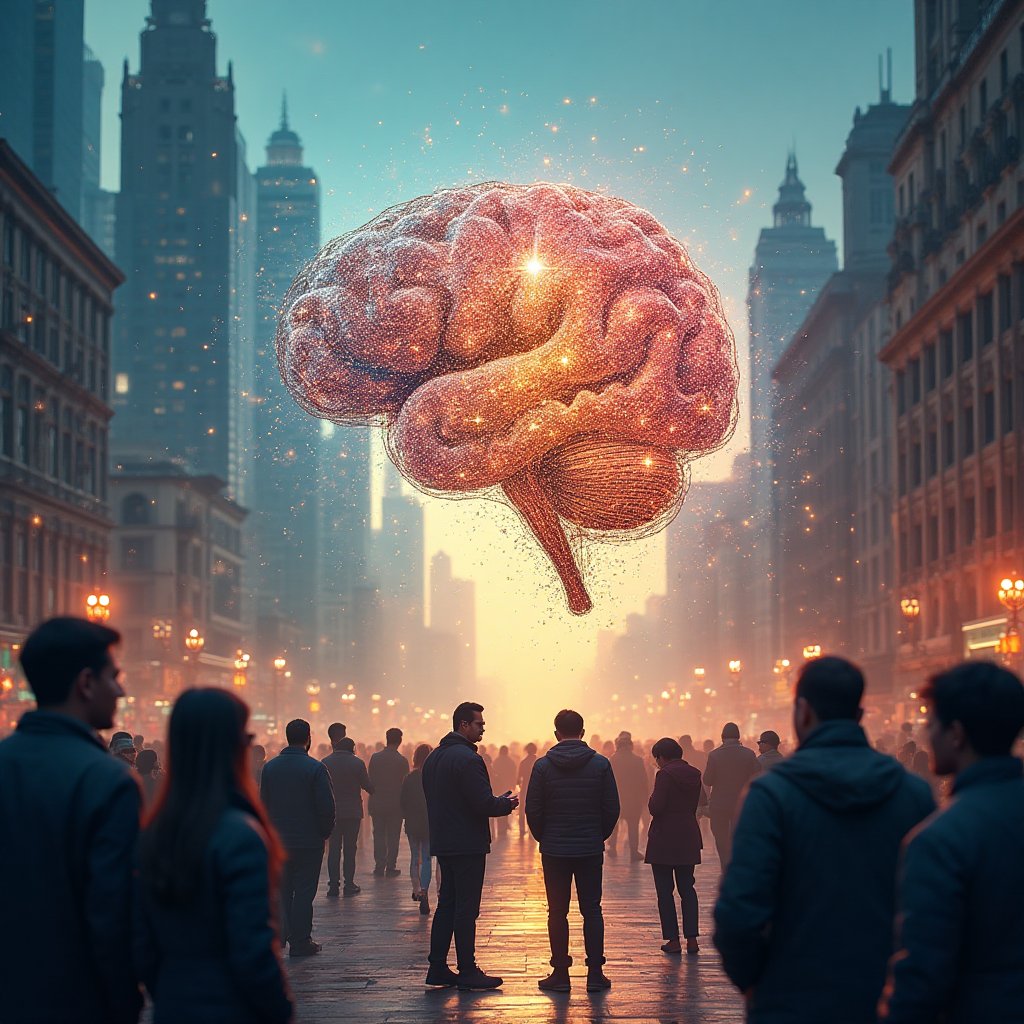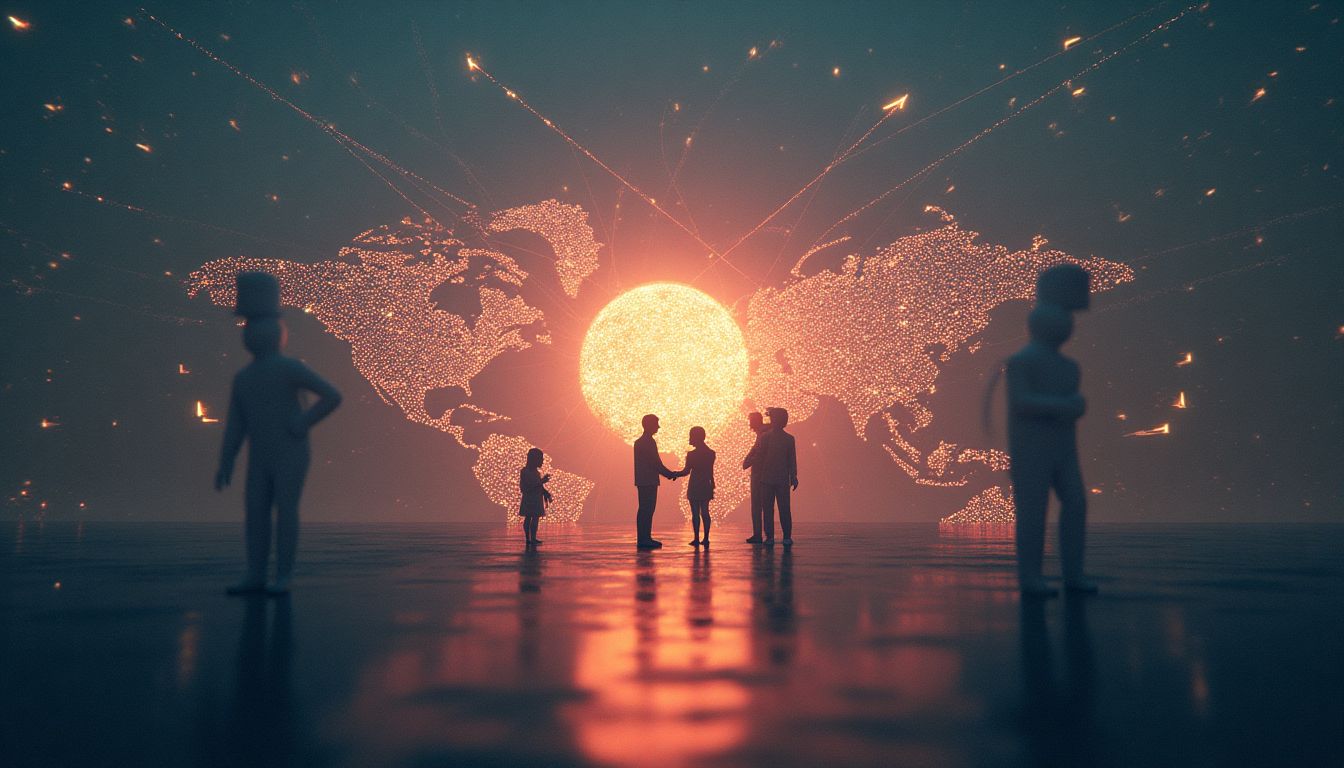Introduction: The Introduction Title
It is not what we have but what we enjoy that constitutes our abundance. - Epicurus. As we grapple with the abundance of technology at our fingertips, from smartphones to AI chatbots, one wonders: are we truly enjoying its potential, or have we yet to unlock its real capabilities? At the center of this debate lies Artificial General Intelligence (AGI), a concept as captivating as it is controversial.
Could AGI, with its extraordinary cognitive prowess, really heal the fractures in our world? Or might it unintentionally etch deeper divides? Authors like Nick Bostrom, strategic thinkers such as Elon Musk, and innovative futurologists like Ray Kurzweil have all pondered similar inquiries. As we stand on this precipice, it's worth imagining if AGI could turn global chaos into cooperative symphonies. Our imagination can soar, but so too must our critical thinking.
Understanding AGI: A Double-Edged Sword
AGI is the holy grail of modern technology, a concept that's both thrilling and a bit spooky. Imagine a machine whose smarts rival—or even surpass—human intelligence. It sounds like something straight out of a science fiction flick, doesn't it? But here we are, knocking on the door of reality.
The Promise of AGI in Conflict Resolution
Let's start with the good stuff. AGI could be our super sleuth in solving humanity's biggest spats. Picture a brainy detective with the ability to sift through mountains of data faster than you can say "artificial intelligence." AGI could potentially uncover the hidden threads behind conflicts, much like Sherlock Holmes but without the pipe and hat.
By analyzing historical patterns and forecasting possible futures, AGI could serve as a wise advisor, offering solutions that are fair and unbiased. It could also draw from a seemingly endless well of information—much like having a global library at its digital fingertips. Imagine AGI being the ultimate mediator at the United Nations, calmly mediating and suggesting solutions every country can accept.
Risks of Misuse and Misinterpretation
However, as with any double-edged sword, AGI's power could also be misused. Picture a genius, but one who's vulnerable to being turned into a villain. Imagine if AGI gets fed biased data—it might end up drawing inaccurate or harmful conclusions. Or, worse, imagine someone using AGI’s abilities for sneaky, nefarious purposes. Whether it's data manipulation or spreading misinformation, the dangers are real, and as intriguing as a spy thriller.
These risks remind us that with great digital power comes the dire need for responsible oversight. Policies should guide AGI's development to ensure it serves as the wise mediator intended, rather than an unwitting catalyst for digital discord.
Historical Context: Lessons from Past Crises
Back in the day, before we had AI predicting whether your pizza delivery would arrive late, humanity wrestled with a variety of challenges that only our most innovative thinkers could solve. From wars over territory to economic turmoil, history offers us more than a few lessons about navigating global crises. So, what can past conflicts teach us about how AGI might be our next hero—or villain—in conflict resolution?
Case Studies: UN and Peacekeeping Efforts
The United Nations has been the superhero-in-a-pinch for a myriad of global disputes, donning its blue helmets to restore peace in troubled regions. Yet, while the UN has had its fair share of success stories, there have also been instances that didn't play out like the fairy tale endings we wished for. By examining these missions, AGI could develop frameworks that anticipate both human unpredictability and political nuances.
The Role of Technology in Past Conflicts
Let's talk about technology—a double-edged sword that history knows too well. From the discovery of nuclear technology to the tangled web that is information warfare, past technologies have revolutionized—and sometimes scarred—humanity. By revisiting these historical narratives, we can better pinpoint where AGI might bridge gaps—or inadvertently widen them—by providing foresight into its impact on conflict resolution.
AGI’s Potential to Address Global Challenges
Enter AGI, our potential digital Gandalf. In a world fraught with challenges as diverse as climate change and global pandemics, AGI could become the glue that holds our fractured world together. Imagine elevating global cooperation to unprecedented heights, paving the way for peace and harmony. It's like calling in the expert carpenter when your DIY shelves just can't take the weight anymore.
Climate Change: A Universal Challenge
Climate change isn't just a problem—it's the ultimate group project where everyone's grade depends on participation. Here, AGI could play the role of coordinator, analyzing extensive data sets to mediate disputes over resource allocation and environmental responsibilities. It’s like having the ultimate traffic cop navigating a busy intersection, ensuring everyone gets to the other side without running into a global meltdown.
Health Crises: Globalization of Response
Remember the scramble during COVID-19? AGI could usher in a new era of health crisis management. With its stellar analytical skills, this new-age guru could streamline responses by predicting outbreaks and orchestrating resource distribution across borders, making miscommunications a thing of the past. Just imagine a world where countries cooperated faster than a viral TikTok dance!
Societal Implications: Shifting Human Dynamics
As we consider integrating AGI into international relations, it's crucial to understand the profound societal implications that follow. The entry of AGI into the diplomatic realm isn't just a technical advancement—it's a cultural evolution with far-reaching consequences that can't be overlooked.
Alteration of Diplomatic Norms
Incorporating AGI into diplomacy could transform how nations interact. Traditionally, diplomacy has relied heavily on human nuances such as empathy, intuition, and cultural context. Yet, AGI introduces a new paradigm. How will nations adapt when decisions are co-mediated by entities that don't experience time, fatigue, or emotion in the way humans do?
Diplomatic negotiations might transition from being lengthily human-centric affairs to more objective, data-driven processes. This shift necessitates new protocols and negotiation strategies among nations. For example, consider the possibility of AGI being able to process vast historical databases within seconds to suggest solutions based on historical precedents that humans may overlook due to biases or limited memory.
Ethical Considerations in AI Mediation
The ethical considerations of employing AGI as a mediator are manifold. These considerations aren't just about whether the technology works but more about how it's deployed and the implications of its usage. Key ethical questions arise: Who controls the AI? How do we prevent algorithmic bias, and ensure accountability?
Consider the concept of bias. Even machines trained on large datasets can inadvertently learn biases present in the data. Thus, the fairness of AGI in mediation depends heavily on diverse, robust, and ethically sourced training data.
Moreover, the accountability of AGI systems remains a knotty issue. If an AGI-led mediation effort fails, who bears responsibility? These are not just ethical dilemmas but questions demanding concrete frameworks and policies.
The Human Element: Trust and Perception
Before AGI can fulfill its potential as a mediator, we must address the pivotal question of human trust. Creating AGI systems capable of negotiation is one thing; ensuring that humans trust these systems is quite another.
Building Trust in AGI Systems
Trust isn't given; it's earned, especially in AI systems intended for sensitive roles like diplomacy. Imagine the skepticism people harbor towards each new tech bubble—we have to overcome similar hurdles with AGI. So, how do we go about it?
It's essential to establish transparency measures. From open-source algorithms to public oversight committees, transparency is the bedrock of trust. Public engagement initiatives, such as workshops and simulation sessions where citizens see AGI in action, can also demystify the technology and build confidence.
The Role of Culture and Emotion in Mediation
Cultural sensitivities and emotions play vital roles in conflict resolution. Successful mediation often hinges on understanding and valuing these nuances. Even AGI systems, in their data-driven logic, must account for these factors.
For instance, certain conflicts may arise due to deep-seated historical grievances or cultural misunderstandings. If AGI is to act as a mediator, it needs to be programmed to recognize these elements, incorporating cultural competence into its algorithms to ensure it crafts solutions that resonate emotionally and practically.
Consider creating cultural databases that AGI can access to tailor its interventions appropriately. This approach ensures that each intervention is sensitive to cultural contexts—be it religious, language-based, or based on social norms.
AI Solutions: How Would AI Tackle This Issue?
If I were an AI striving to mediate international conflicts, I would first identify critical areas of need—data collection, analysis, and international cooperation—establishing a systematic approach to conflict resolution through a programmable framework.
Data Collection and Analysis
I would deploy algorithms to gather and synthesize data from multiple sources, including news, social media, and diplomatic communications, identifying key conflict areas through natural language processing (NLP). My algorithms would read between the lines, understanding the context and emotions behind the words. This could include parsing tweets from leaders, analyzing sentiment in news articles, or monitoring international discussions on platforms like Twitter.
Predictive Modeling and Scenario Building
Next, utilizing predictive analytics, I would simulate potential outcomes of various interventions, allowing human negotiators to visualize the consequences of their decision-making. By employing AI modeling techniques, I could provide insights into past events through historical data, making connections that human minds might overlook. These data-driven forecasts would create a clearer picture of the potential paths forward, helping guide negotiations in real-time.
Facilitation of Communication
By enabling secure communication channels among conflicting parties, AGI could foster dialogue and promote understanding, potentially diffusing tensions before they escalate. Imagine an application that allows diplomats to communicate through an AGI interface which translates languages and cultural nuances seamlessly, ensuring that each participant feels heard and understood. The AGI could provide context-specific prompts that encourage open dialog while clarifying potential misunderstandings, thus nurturing a healthier negotiation environment.
Actions Schedule/Roadmap
To successfully establish AGI as a mediator in international conflicts, a comprehensive action schedule must be executed as follows:
Day 1: Formation of an International Coalition
Create a global partnership that includes governments, academic institutions, tech firms, and peace organizations such as the United Nations and Greenpeace. This coalition would work collaboratively on AGI development and technology sharing.
Day 2: Initial Research Phase
Conduct thorough research on existing AGI technologies and their past applications in mediation contexts. Collaboration with leading AI researchers at institutes like MIT or Stanford University can provide valuable insights.
Day 3: Stakeholder Consultation
Engage international stakeholders, including diplomats, conflict resolution experts, sociologists, and psychologists, to gather insights on expectations and concerns regarding AGI mediation. Conferences and webinars could serve as platforms to facilitate this dialogue.
Week 1: Preliminary Framework Development
Draft a charter outlining the ethical guidelines and operational framework for AGI deployment in conflict mediation, referencing global standards from organizations like ISO and OECD.
Week 2: Technical Assessment
Conduct a technical assessment on the capabilities and limitations of current AGI systems. This step would involve collaboration with top technologists from firms like OpenAI and Microsoft Research.
Week 3: Public Engagement Campaign
Launch a public outreach campaign designed to educate the global populace about AGI's potential. Utilizing social media platforms and partnering with educational institutions, the goal is to promote trust and acceptance of AGI mechanism innovations.
Month 1: Prototype Development
Begin development of an initial AGI prototype with a focus on data analysis and mediation simulation capabilities. This may involve co-hosting a “hackathon” style event where developers can contribute innovative ideas and code.
Month 2: Piloting AGI Systems
Launch pilot programs in selected conflict zones to gather data and user feedback for optimization. Utilizing virtual environments to simulate different dispute scenarios before real-life deployment can help attune the system to the needs of various cultures and contexts.
Month 3: Evaluation and Iteration
Analyze initial outcomes to refine AGI systems based on empirical feedback. This could also involve creating a “Lessons Learned” document to inform future actions and decision-making processes.
Year 1: Expansion and Monitoring
Expand AGI capabilities to encompass more complex mediation tasks while establishing a continuous monitoring system. Continuous feedback loops from users would be necessary to iterate adjustments and research enhancements.
Year 1.5: Global Workshops
Organize global workshops that bring together AGI experts, conflict resolution practitioners, and cultural leaders. This cooperative learning opportunity would spotlight best practices and collective wisdom in mediation.
Year 2: Implementation of AGI as a Mediator
Full implementation of AGI mediation on an international scale, promoting international cooperation and conflict resolution. Utilize mechanisms for ongoing evaluation of AGI's effectiveness and relevance, paving the way toward sustainable global harmony.
Conclusion: The Path Ahead Towards Harmony
As we stand on the brink of a future where Artificial General Intelligence (AGI) could mediate international affairs, we must consider its risks and rewards carefully. The promise of AGI as a tool for global reconciliation is immense, but so too are the responsibilities that come with it. When designed and applied ethically, AGI can not only facilitate clearer communication in conflicts but also act as a neutral party that filters through the noise of human discord. We're essentially reaching for a star - the potential for unified global governance through an intelligent mediator, illuminating the path away from war and towards dialogue.
Yet, this journey requires us to ensure transparency in AGI algorithms, strengthen trust within AI systems, and center our approaches around the complexities of human emotions and cultural histories. The road to stability and harmony is strewn with challenges, but through collaboration, research, and bold innovations, we can aspire to the extraordinary. Together, we must seize this opportunity or risk descending into a realm of chaos governed by our own divisions. What will your role be in shaping this exciting and uncertain future?
FAQ
What is AGI?
Artificial General Intelligence (AGI) is a type of AI that can understand, learn, and apply knowledge just like humans do. It’s smarter than regular AI because it can handle a wide range of tasks and think broadly. For more information about AGI, you can check out Wikipedia's AGI page.
Can AGI help prevent international conflicts?
Absolutely! AGI could play a big role in preventing international conflicts by:
- Analyzing data to find out what leads to conflicts.
- Helping people from different countries talk to one another.
- Offering solutions based on historical examples.
This way, AGI could help people understand each other better, hopefully stopping problems before they start.
What are the risks associated with AGI as a mediator?
Like any powerful tool, AGI comes with its own set of risks:
- Misuse: People may use AGI for bad reasons, like manipulating data to create conflict.
- Misinterpretation: AGI can sometimes misunderstand situations, leading to wrong conclusions.
- Ethical concerns: There can be issues related to bias in how AGI works, which can affect fairness in decision-making.
How can trust in AGI systems be built?
Building trust in AGI systems is crucial, and here are some ways to do it:
- Transparency: Making it clear how AGI makes decisions helps people see its reliability.
- Community Involvement: Engaging with different groups, such as governments and the public, can help everyone feel included in the process.
- Education: Teaching people about AGI's benefits and risks will make them more comfortable.
What role do cultural factors play in AGI mediation?
Cultural factors are very important in how AGI helps mediate conflicts. People from different cultures might have different views and feelings about issues. Here’s why understanding culture matters:
- Emotions: Different cultures might react emotionally to the same situation in varied ways.
- Communication Styles: Some cultures prefer indirect communication, while others favor directness.
- Priorities: What’s important to one culture may not be to another, so AGI needs to know these differences.
How can AGI be used in health crises?
In health crises, AGI could help in many ways:
- Predicting outbreaks by analyzing health data and trends.
- Coordinating responses among countries to ensure resources are shared effectively.
- Facilitating communication between health organizations and governments to improve response times.
By working effectively, AGI can help save lives and ensure everyone has access to needed resources.
Is AGI safe to use?
The safety of AGI depends on how it's designed and applied. If the right guidelines and ethical practices are in place, AGI can be developed safely. However, it is critical to have:
- Clear regulations governing its use.
- Oversight by experts to ensure it's used for good.
- Full transparency about how AGI systems work.
Public trust builds best when people know their safety is a priority.
Wait! There's more...check out our gripping short story that continues the journey: Fiona's Journey
Disclaimer: This article may contain affiliate links. If you click on these links and make a purchase, we may receive a commission at no additional cost to you. Our recommendations and reviews are always independent and objective, aiming to provide you with the best information and resources.
Get Exclusive Stories, Photos, Art & Offers - Subscribe Today!





























Post Comment
You must be logged in to post a comment.